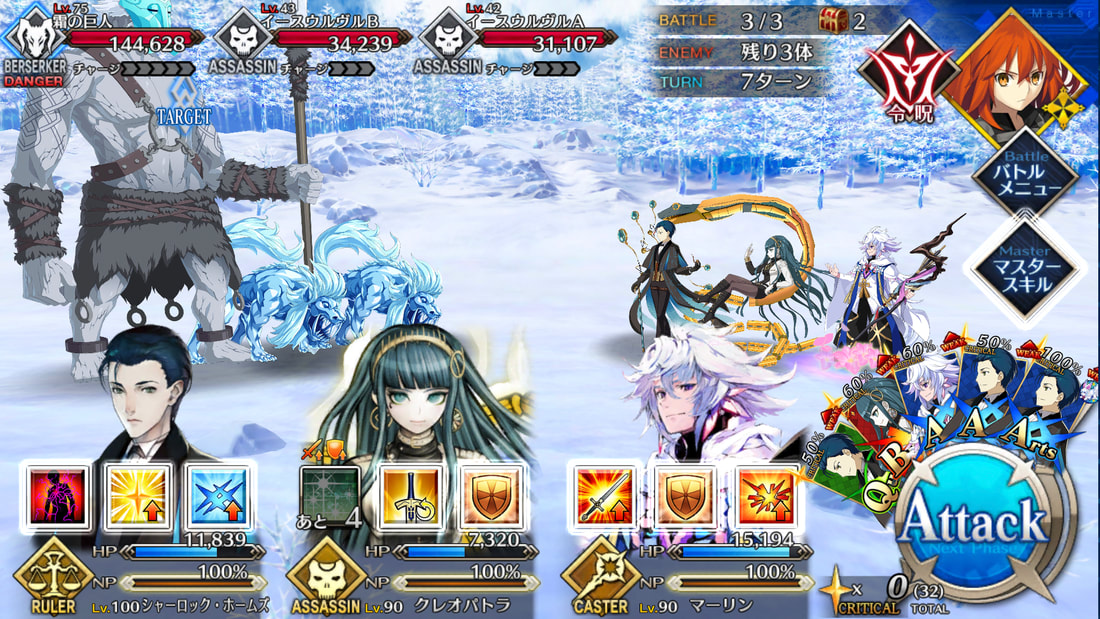|
Free-to-play mobile games don't exactly have the best reputation. They are, generally speaking, timekillers, meant to draw players in with addictive gameplay mechanics and then entice players to spend money on individual purchases that can speed up play. There's nothing wrong with this model, of course, and games like that are great for when you have a few minutes to fill while waiting for something else, but generally speaking if you want a rewarding and high-value experience worth sinking hours and hours into, you probably want to look elsewhere. There is, however, a sub-genre of free-to-play mobile games that asks for a considerably larger time investment: gacha games. Gacha games, named after their trading-card-pack-esque monetization system, tend to be much more involved than something like, say, Candy Crush, usually centering on some sort of RPG-style battle system and asking players to build up strength over the course of many weeks and months in order to tackle the hardest content the games have to offer. These games have proliferated wildly over the past few years, and they have a (generally well-earned) stigma for being greedy time-sinks that can end up feeling more like work than play. These games usually feature characters from an existing franchise--Final Fantasy has at least three gacha games currently active, for example--and most gacha games rest heavily on that appeal. Passable RPG mechanics and strong licensing are often enough to maintain a profitable gacha game, which means many gachas don't have much of a reason to do anything particularly ambitious. They often become formulaic fairly quickly, Problematic as the style of game may be--and there's certainly a fair degree of controversy surrounding their gambling-esque purchasing systems--there is still room for the occasional gem. One such gem is Type-Moon and Delightworks's Fate/Grand Order, a rare example of a game that, rather than being weakened by its free-to-play mobile status, leverages the strengths of the platform in order to create a truly unique and exciting experience. I started playing Fate/Grand Order (hereafter FGO) in earnest while I was in Japan--one of my friend groups spent a lot of time playing it and talking about it, which got me more interested, although I'd had an account for a while before then--and about a year and a half later I still play actively. The game continues to grow and evolve in exciting ways, and I don't see myself dropping the game any time soon. A Rough Start As with most gacha games, FGO is based on an existing franchise--in this case, the works of the popular Japanese author Kinoko Nasu. Most of Nasu's works exist in the same general universe, with a few concepts and a very small group of characters who will occasionally pop up throughout his different books and games. His popularity in Japan coupled with his well-defined world made a Fate-themed gacha game a natural occurrence. The game features a wide range of characters from Nasu's works (as well as some original characters and some from works other authors have written in the same universe), and it takes the form of a series of visual-novel-style story chapters coupled with basic turn-based RPG mechanics. Given that the original Fate/Stay Night was itself a visual novel and that Nasu is a generally brilliant author, this all sounds like a really good idea. Unfortunately, early-game FGO was really bad. Although Nasu wrote the game's prologue, the first five main story chapters were written by other others, and the early ones especially clearly had little thought behind them. These chapters (which remain in the game, as the later game builds upon them), are largely nonsensical, consisting of bare-bones justifications for fighting various monsters-of-the-week. It's painful to read through and boring to play. Additionally, the game's battle system was not particularly well thought-out, and it was hugely unbalanced early on, with high-rarity characters in many cases being completely outclassed by lower-rarity competition, and with all kinds of inconveniences and annoyances built into the gameplay. To add insult to injury, the game's servers were highly unstable, often leaving the game down for days at a time, and new content additions were rare. By all rights, the game should have crashed and burned. That it survived this early time is a testament to how much people like Nasu's work. FGO may have been bad, but it was a game with Fate characters, and the premise of the game was interesting enough to make people stick with it. And even more than that, it was a massive financial success. When one of Fate/Stay Night's main antagonists--Gilgamesh, the Sumerian hero--was added to the game, FGO jumped to the top of Japan's top-grossing app charts, where it has lived for the past three years. Fortunately, this financial success gradually led Delightworks and Type-Moon to start taking FGO more seriously. The quality of the game's writing has been gradually improving over the game's lifetime, and now FGO rightfully touts its focus on storytelling as a key advantage FGO has over other gacha games. The quality of the game's art and animations has similarly improved, and the list of notable illustrators and voice actors working on the game has steadily grown. Delightworks has added to and improved FGO's slapdash battle system piece-by-piece, and while the game would likely be stronger if its base mechanics were more sensible, the gradual improvements and the newfound attention to balance have turned FGO into a surprisingly deep and enjoyable RPG. It's kind of amazing to see how far FGO has come in the past three years--it's gone from being a fairly blatant cash-grab to being a unique and high-quality experience that's brought together a wide range of artists to collaborate on a massive, ongoing work of art. It's really pretty exciting to follow. A Contemporary Serial Novel The basic premise of the first of FGO's story arcs is that the world has ended due to someone interfering in key moments in history. A small group of researchers operating out of an institution named Chaldea summons "heroic spirits"--great heroes of history, myth, and literature--and travels to those key historical moments to return events to their proper path. The second story arc, which started about a year ago, has a slightly more complex premise, but the structure is basically the same. Every few months, the game adds a new story chapter, in which the main characters visit another location and time period, meet another group of heroic spirits, and solve whatever problem is happening. It's mostly science-fiction, albeit with some fantasy elements depending on the story chapter. The early game, again, was less than compelling. The story chapters were short and forgettable, and the characters were uninteresting and flat. Potentially intriguing figures like Emperor Nero or William Shakespeare were reduced to single gimmicks and often only had a few lines, and there was little sense of danger or urgency. The third story chapter has some nice character moments with Asterios (the minotaur from Greek myth), and the fifth story chapter has a higher sense of stakes, but the sixth story chapter--Camelot--is where the game really began to pick up. Camelot is noticeably longer (and more difficult) than the earlier story chapters, and it is also much more narratively complex. Camelot's antagonists have identifiable rationales for their actions, instead of just being evil for the sake of being evil. Characters have meaningful interactions and rounded personalities, and the overarching plot starts to take more of a central role. The following chapter, Babylonia, continues this trend, and starting with Babylonia each of the game's chapters becomes comparable in length and quality to modest-length visual novels. FGO's second story arc has been yet higher in quality (and also very long), to the point where it is legitimately exciting when a new story chapter is released. FGO now has a rich cast of complex heroes and villains, each with their own values and motivations, and the newer story chapters explore interesting moral and ethical dilemmas. FGO has, in effect, become the digital equivalent of a serial novel, except you don't have to pay anything to read it if you don't want to. What started off as just a cool concept--traveling through time alongside famous historical figures--has become an exciting ongoing story. Even though the story components of the game are entirely free, I would credit it with most of FGO's ongoing financial success. Chilling with Oda Nobunaga Even without FGO's recent narrative strength and the popularity of Kinoko Nasu's works, though, part of FGO's success has to be accredited to the fact that it's just a really fun concept. The heroic spirits in FGO range from household names--Thomas Edison, Frankenstein's Monster, King Arthur--to the relatively obscure--Charles Babbage, the father of the computer; the 11th-century assassin Hassan-e Sabbah; Tomoe Gozen, the woman warrior from The Tale of the Heike--and seeing those figures interact makes FGO quite interesting. Each character addition involves a high level of detail, from visual art to battle animations to voice acting, and it's always exciting when the game adds someone new. These character interactions factor heavily into the main story chapters, but they also play a role in the more comedic event stories. These stories are separate from the main story chapter and place FGO's heroic spirits in unusual and often funny situations. The Summer 2017 event, for example, featured six teams of heroic spirits in a cross-country race meant as an homage to Steel Ball Run, the seventh part of the classic manga Jojo's Bizarre Adventure. Seeing characters as diverse as Sherlock Holmes's James Moriarty and the ancient Egyptian pharaoh Nitocris interacting in that sort of a setting is something you aren't going to see anywhere else, and that alone makes FGO appealing. This applies to the game's gameplay as well. FGO involves using teams of three heroic spirits, and while these teams are often selected for their gameplay usefulness, it's entirely possible to run teams of related or thematically-appropriate characters. It can also be fun to pair unrelated characters who wouldn't usually appear together in the same work--there's something inherently amusing about Sherlock Holmes, Cleopatra, and Merlin traveling through time together to save the world. Gacha games aren't for everyone. They require a commitment over a long period of time in order to fully enjoy, and this long timescale is often somewhat of a disadvantage. FGO turns the structure of gacha games from a financial necessity to an artistic strength, which is a large part of why it stands as arguably the best gacha game on the market. Most games are released as complete and self-contained works--as they should be--but there's something really exciting about following along with a project that's continually growing and evolving, constantly wondering what's over the next horizon. FGO is something that couldn't have existed ten years ago. The confluence of modern technology, mobile gaming trends, and Kinoko Nasu's writing produced this phenomenon by sheer coincidence, but it's been managed well and I continue to look forward to seeing what comes next.
As with any always-online game, FGO will eventually end, and its time-traveling serial-VN narrative will end with it. Until that time, though, I plan to continue exploring the past alongside the Chaldea Security Organization. It's one heck of a ride. Leave a Reply. |
Isaiah Hastings
A Japanese Lit major and aspiring game designer with a passion for storytelling and music composition Archives
August 2019
Categories |
Proudly powered by Weebly


 RSS Feed
RSS Feed